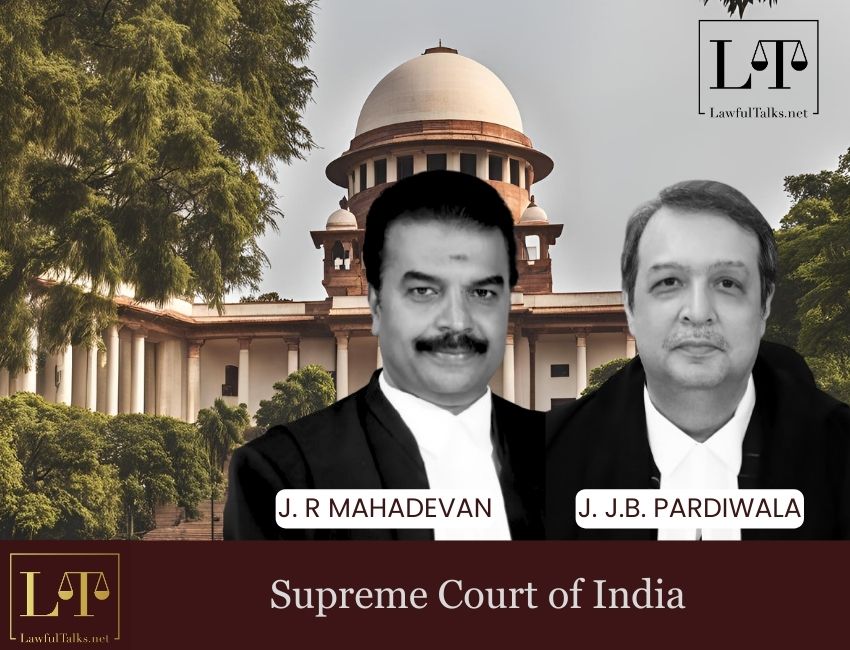Allahabad HC Sets Aside Afzal Ansari's Conviction, Allows Him to Continue as MP

The Supreme Court has set aside an order of the Madhya Pradesh High Court while scrutinizing whether a compromise decree confirming pre-existing rights requires registration and whether such a decree is chargeable with stamp duty.

The bench of Justice J.B. Pardiwala and Justice R Mahadevan were hearing a Civil Appeal where the Appellant had filed a suit for declaration and permanent injunction, claiming ownership and possession of land against the adjacent land owner (Respondent No. 2). Pending the suit, both parties entered into a compromise, based on which, the suit came to be decreed in favour of the Appellant.In terms of the said order, the Appellant applied for mutation before the Tehsildar, who in turn referred to the Collector of Stamps, who imposed a stamp duty of ₹6,67,500 on the Appellant.The Appellant challenged this decision before the Board of Revenue and the Madhya Pradesh High Court but failed, leading him to appeal in the Supreme Court.
While scrutinizing the issue of the Registration of the document, the bench referred to Section 17(2)(vi) of the Registration Act and observed that a compromise decree would not require registration if the below-mentioned three conditions mentioned under Section 17(2)(vi) are fulfilled:
“(i)There must be a compromise decree as per the terms of the compromise without any collusion;
(ii)The compromise decree must pertain to the subject property in the suit; and
(iii)There must be a pre-existing right over the subject property, and the compromise decree should not create a right afresh.”
The bench noted that Appellant’s compromise decree only asserted pre-existing rights and did not create new rights. Thus, it did not require registration.
Further, the bench moved to the issue of payment of stamp duty and observed that stamp duty is applicable only to instruments explicitly listed in Schedule I or I-A, in conjunction with Section 3 of the Indian Stamp Act, 1899, and since the Appellant’s compromise decree did not create new rights but merely confirmed existing ones, is not subject to stamp duty.
The bench observed that "it is apparent that stamp duty is not chargeable on an order/decree of the Court as the same do not fall within the documents mentioned in Schedule I or I-A read with Section 3 of the Indian Stamp Act, 1899. Though the Collector of Stamps determined the stamp duty for the subject land as per Article 22 of Schedule IA of the Indian Stamp Act, 1899, which states about conveyance, in this case, we have already held that the compromise decree does not fall under the instruments mentioned in the Schedule and that it only asserts the pre-existing rights. Therefore, in the facts of the case, the consent decree will not operate as conveyance as no right is transferred and the same does not require any payment of stamp duty. Since the appellant has only asserted the pre-existing right and no new right was created through the consent decree, the document pertaining to mutation of the subject land is not liable for stamp duty.”
Thus, after due consideration, the court set aside the order of the High Court, and accordingly, the appeal was allowed.
Case Title: Mukesh v. The State Of Madhya Pradesh & ors., Civil Appeal No. 14808 of 2024
Advocate For Petitoner(s): Sr. Adv. Mr. Puneet Jain, Ms. Christi Jain, AOR, ors
Advocate For Respondent(s): Mr. V.v.v. Pattabhiram, D.A.G., Ms. Mrinal Gopal Elker, AOR, ors

Akshaj Joshi
Law Student
Latest Posts
Categories
- International News 19 Posts
- Supreme Court 390 Posts
- High Courts 383 Posts



















































































































































































































































































































































































































































































































































































































































































































































































































